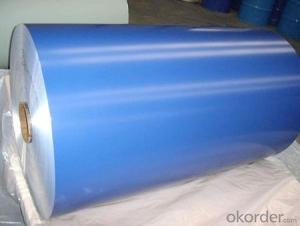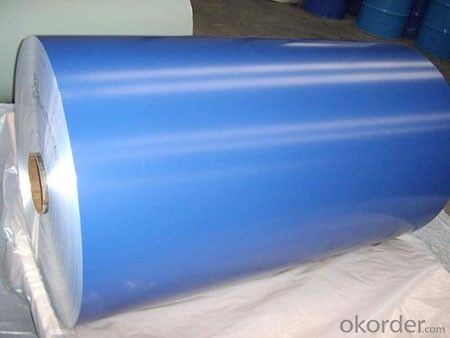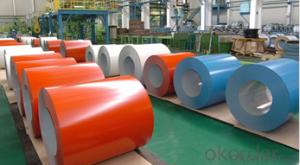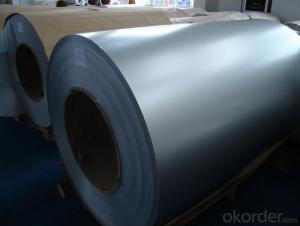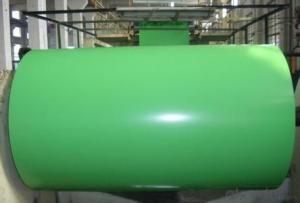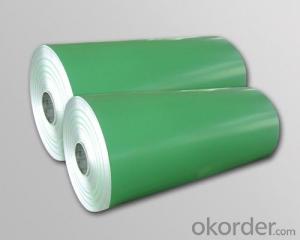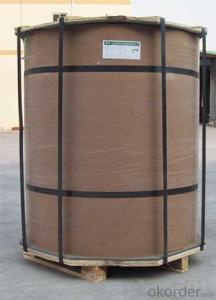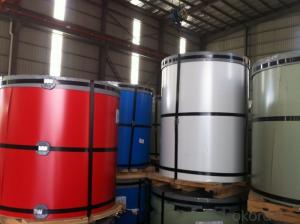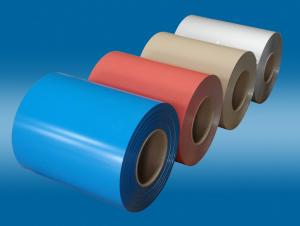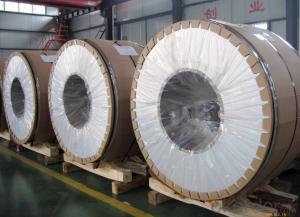Aluminum Copper Coil - PE Coated Aluminium Coil 5xxx
- Loading Port:
- China Main Port
- Payment Terms:
- TT OR LC
- Min Order Qty:
- -
- Supply Capability:
- -
OKorder Service Pledge
OKorder Financial Service
You Might Also Like
Product Description:
1 Specifications of PE Coated Aluminum Coil/Sheet
Alloy | AA1050,AA1060, AA1070, AA1100, AA3003, AA3004, AA3005, AA3105, AA5005, AA5052, AA5754, AA5083, AA8011 |
Temper: | H12, H14, H16, H18, H22, H24, H26, H32,HO, F |
Thickness: | 0.10-4.0mm |
Width: | 10mm- 2000mm |
Coating | PE(Polyester) |
Painting Thickness | Standard 16-25 microns, max 40 microns |
Color | Acording to Ral colors or customer’s samples |
Standard: | GB/T17748-1999, ASTM, ISO, EU standard |
Special Specification is available on customer’s requirement | |
PE(polyester) Coating
PE(polyester) coating:high molecular polymer as monomer and addition of alkyd, is an UV-resistant coating. It can be classified matt and glossy according to coating gloss. The compact molecule structure, makes paint surface luster and smooth,which assure good printing on the panel surface. With an warranty of 8-10 years for weather resistance, it is specially applied for internal decoration and sign board.
2 Usage/Applications of PE Coated Aluminum Coil/Sheet
Our company's PE Coated Aluminum Coil/Sheet have been widely used in the fields of construction and decoration(garage doors, ceiling etc.), electronic appliances, lighting decoration, air-condition air pipe, sanwich panels and drainage, etc.
- Q: Can aluminum coils be used in the production of consumer goods?
- Yes, aluminum coils can be used in the production of consumer goods. Aluminum is a versatile and lightweight material that offers several advantages for consumer goods manufacturing. It is highly corrosion-resistant, making it suitable for products that are exposed to moisture or outdoor elements. Additionally, aluminum coils can be easily formed and shaped, allowing for customization and efficient production processes. Aluminum is commonly used in various consumer goods such as kitchen appliances, automotive parts, packaging materials, and electronic devices. Its properties make it an ideal choice for manufacturers looking to produce durable, high-quality consumer goods.
- Q: my text says aluminium does not corrode much as a passive aluminium oxide layer is formed on it.Well other metals such as sodium adn potassium also form oxides. Why dont their oxides prevent further oxidation ?
- sodium oxide and potassium oxide are water soluble aluminium oxide is not water soluble. the layer formed of oxide on the aluminium surface is coherent and adherent with no pores and stuck to the metal surface. the layer is also passive to most acids and alkalies except HCl and anti passive ions if present. sodium oxide and potassium oxide dissolve in any aqueous medium forming the corresponding alkalies NaOH and KOH leaving the fresh metal surface exposed to more corrosion. also the reaction of Na and K with aqueous media like water and acids is quite vigorous and fast unlike aluminium which is mu less reactive
- Q: im looking for a bat but i dont know what to get wood or aluminum what is harder wood or aluminum ?? what would be better for hitting hard balls with ( or maybe people ) haha no im joking i need help !!!!
- why dont get wack each one over your head and see which hurts more. than you'll get your answer, just kidding. you should know metal is always harder than wood. but for baseball, you want a wooden bat, better for the swing, and the grip. I used to play little league back in the day and used aluminum bats, and even with batting gloves my hands were always killing me after the game.
- Q: How do aluminum coils compare to other metals in terms of strength?
- Aluminum coils generally have lower strength compared to other metals such as steel or titanium. While aluminum is lightweight and offers good corrosion resistance, it may not possess the same level of strength and durability as some other metals. However, the specific strength of aluminum coils can vary depending on the alloy composition and manufacturing process.
- Q: Are aluminum coils suitable for food processing applications?
- Food processing applications can benefit from the use of aluminum coils. Aluminum is a versatile material widely utilized in the food industry for its advantageous properties. It is resistant to corrosion, non-toxic, lightweight, and possesses exceptional thermal conductivity. These qualities make aluminum coils perfect for various food processing tasks like cooking, storage, and transportation. Aluminum coils find their application in the production of cookware, food packaging, and food processing equipment. They are frequently employed in the manufacturing of kitchen utensils such as pots, pans, baking sheets, and more. The remarkable thermal conductivity of aluminum ensures uniform distribution of heat, enabling efficient cooking and eliminating hot spots. Moreover, aluminum coils are commonly utilized in food packaging, including beverage cans and canned foods. Aluminum cans are lightweight, durable, and provide a protective barrier against light, moisture, and air, thus preserving the quality and freshness of the food products. Additionally, aluminum coils are suitable for food processing equipment like heat exchangers, evaporators, and refrigeration systems. The corrosion-resistant nature of aluminum prevents contamination, thereby ensuring the hygiene and safety of the processed food. It is crucial to note that aluminum coils utilized in food processing applications must meet specific food-grade standards to ensure they do not release any harmful substances into the food. These standards are set by regulatory bodies like the Food and Drug Administration (FDA) in the United States and similar organizations globally. Overall, due to their corrosion resistance, non-toxicity, lightweight, and excellent thermal conductivity, aluminum coils are highly suitable for food processing applications. Their extensive usage in the food industry for cooking, packaging, and processing equipment significantly contributes to the safety and efficiency of food production.
- Q: like we have seen a disk of aluminum spinning, and a permanent magnet repell the plate because apparently because of temporary hystersis and because the north or south field causes the same in the aluminum, so why wont a plate of ruby do the same thing? Are not all metals, crystals? Perhaps its just too big and difficult a question for you simple huumans,..eh?
- A synthetic ruby may be made of aluminum, but that is not ALL that it is made of. The primary material in all rubies is aluminum oxide. So you need oxygen. It's not like the stuff is hard to find... they probably don't even need to overtly add it when they manufacture rubies. And of course, that creates a world of difference. Ferric oxide (a.k.a. rust) isn't magnetic either, even though iron is very strongly so. Aluminum is NOT naturally magnetic (though I'm sure it can be induced)... but if the parallel holds one might imagine that aluminum oxide would be just as nonmagnetic as ferric oxide, neh? As for metals being crystals... yes, that is so. But keep in mind also that just because all metals are crystals, it doesn't mean that all crystals are metals. Metals are (by definition) malleable, ductile, lustrous, and conductive. None of these things can be said of ALL crystals. Ruby may be a crystal, but it is not even vaguely a metal.
- Q: Automotive aluminum coil, using GB H22, what brand, what are the main ingredients?
- 5754-H22 aluminum sheet has the characteristics of medium strength, good corrosion resistance, weldability and easy processing. It is a typical alloy in Al-Mg (mg Al alloy) alloy. In the corresponding foreign brands for AlMg3, 5754 different heat treatment is the automobile manufacturing industry (car door, mould, seals), main materials used for canning industry
- Q: What is the typical thickness of an aluminum coil?
- The thickness of an aluminum coil can differ depending on its intended purpose and use. Generally, aluminum coils can have a thickness ranging from 0.006 inches (0.15 mm) to 0.25 inches (6.35 mm). Thinner coils are frequently utilized for lightweight applications like packaging materials, whereas thicker coils are commonly found in industries such as construction, automotive, and aerospace, where strength and durability are crucial. It is worth mentioning that the precise thickness requirements may vary depending on the unique needs and specifications of the project or product being manufactured.
- Q: What are the different coil packaging materials used for aluminum coils?
- There are several different coil packaging materials commonly used for aluminum coils. These materials are designed to protect the coils during transportation and storage, ensuring they arrive at their destination in good condition. One of the most popular coil packaging materials for aluminum coils is plastic. Plastic packaging can come in the form of shrink wrap, stretch film, or plastic bands. Shrink wrap is often used to tightly encase the coils, providing a secure and protective covering. Stretch film, on the other hand, is used to tightly wrap the coils together, preventing them from shifting and potentially causing damage. Plastic bands are used to secure the coils together, offering an additional layer of stability. Another commonly used packaging material for aluminum coils is paper. Kraft paper or corrugated cardboard is often used to wrap and protect the coils. This type of packaging provides cushioning and prevents the coils from scratching or rubbing against each other during transit. Paper packaging is also easily recyclable, making it an environmentally friendly option. In addition to plastic and paper, steel strapping is sometimes used to package aluminum coils. Steel strapping offers excellent strength and durability, ensuring that the coils remain securely bundled during transportation. This type of packaging material is particularly useful for heavy-duty applications where extra protection is needed. Overall, the choice of coil packaging material for aluminum coils depends on factors such as the size and weight of the coils, transportation requirements, and the level of protection needed. By using the right packaging materials, aluminum coils can be safeguarded against damage and arrive at their destination in optimal condition.
- Q: Can aluminum coils be used in the production of aluminum cladding?
- Yes, aluminum coils can be used in the production of aluminum cladding.
Send your message to us
Aluminum Copper Coil - PE Coated Aluminium Coil 5xxx
- Loading Port:
- China Main Port
- Payment Terms:
- TT OR LC
- Min Order Qty:
- -
- Supply Capability:
- -
OKorder Service Pledge
OKorder Financial Service
Similar products
Hot products
Hot Searches
Related keywords
